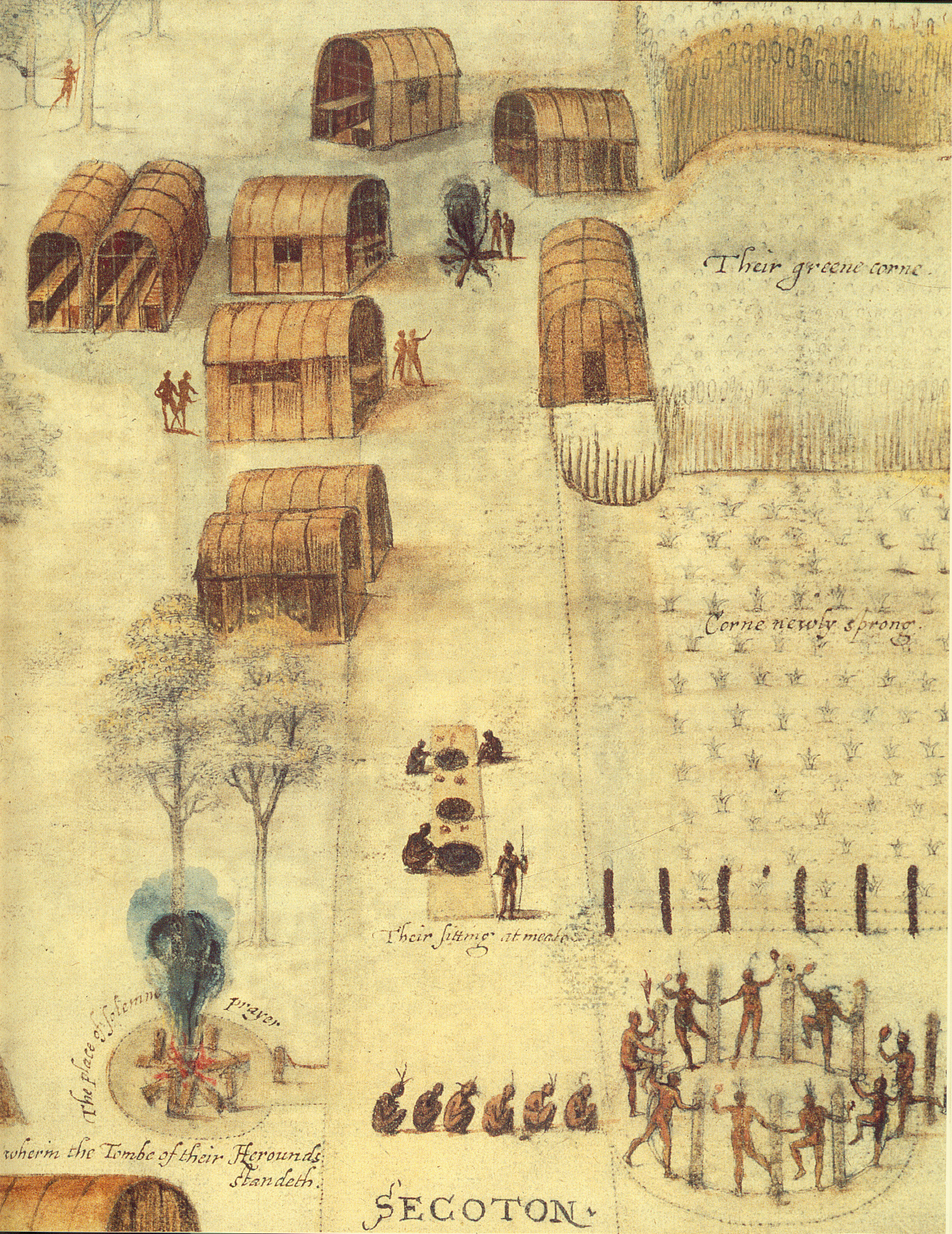John Smith
English official involved in colonizing Roanoke; taken captive by Powhatan in 1607; surveyed and produced a map of colonial Virginia that blended European and Native knowledge
Northwest Passage
Highly sought-after passage to Asia that inspired voyages of peple like Verrazzano ("sea of Verazzano"); The NW Passage was said to connect the Atlantic and Pacific through the Arctic ocean, thus dramatically reducing time spent traveling from Europe/the New World to increasingly valuable markets in Asia
Columbus's 1492 voyage
Sought Asia, but found what are now the Bahamas; proved that European people could survive passage through the Torrid Zone, which was believed to be uninhabitable but full of valuable natural resources
Atlantic vs. Continental history
Atlantic: focuses on movement and change across space (ex: movement of colonists from London to VA); Continental: focuses on continental Indigenous life/shift away from coastal edges to the continental interior (ex: impact of colonization in VA on Algonquian peoples)
Queen Anne's War
War fought between Great Britain and France in Europe and on the American continent from 1702-13; French forces and their native allies raided several English frontier settlements including Deerfield, Massachusetts
William Penn
Florida
Images from Roanoke 
Watercolor drawings by English official John White that documented Algonquian people and their settlements; presented a fairly unbiased view of Indigenous society as organized, civil, etc.
Sugar Revolution
17th century shift to sugar production in the Caribbean; rise of plantation societies with Black majorities in places like Barbados and Jamaica; sugar as one of the most profitable commodities in the British Empire
Ensign Controversy
Radical Puritan milita leader John Endecott's removal of the cross of St. George from the Massachusetts Bay militia flag (JE argued it was idolatry); Endecott was removed from office but eventually returned to public life as governor of Mass Bay Colony; important reminder of Puritan influence in social, political, military life in Mass Bay
Mary Rowlandson
Lancaster, Massachusetts colonist taken captive by Native peoples during King Phillip's War; published a captivity narrative that traced her time as a captives, her "removes" through the frontier, and her treatment as a captive
Norumbega
Global megaregions before European colonization
Pax Mongolica and the Silk Road, Incan Empire, Western European market towns, African Sahel trade, and the Mississippian chiefdoms in North America were each globally important and prosperous societies that engaged in long distance trade, warfare, and expansion before the age of European colonization
Playoff System
Tendency of Indigenous nations and communities to "play" European powers off of each other in order to secure better access to trade goods, alliances, and stop European encroachment on Native lands
Yamasee War
Conflict between Yamasee and Carolina colonists borne out of increasing demands for Native slaves and deerskins; Yamasee fighters staged targeted frontier attacks on plantations leading many colonists to flee to Charles Town (Charleston)
Opechancanough
Algonquian; Powhatan's brother; led Algonquian uprisings of 1622 and 1644 (the Anglo-Powhatan Wars)
Barbados
Caribbean island colonized by the British in the 1620s; colonial leaders sought to replicate tobacco agriculture in VA and did so using indentured Irish labor until the Barbados Conspiracy of 1692 and sugar revolution that led to a plantation society with an enslaved Black majority
Commodities
Some major New World commodities include tobacco, sugar, and rice; important for understanding economics and trade, but also shape colonial life based on labor supply, cultivation and harvest patterns, etc.
Great Migration
17th century migration of Puritans to (primarily) New England and the Caribbean following Laudian persecution in England
Tacky's Revolt
1760 uprising by enslaved people in Jamaica led by Tacky and a group of enslaved Akan descended warriors; eventually quashed by the British navy with help from allied Jamaican Maroons
Nathaniel Bacon
Elite member of VA house of burgesses who led the 1676 rebellion against Virginia's royal colonial govt; led former indentured servants who felt they were not granted access to lands they had been promised at the conclusion of their servitude and wanted to exterminate Native Americans; Bacon's Rebellion facilitated shift between servitude and slavery in VA
Restoration Colonies
Colonies granted by King Charles II after restoration of the English monarchy and the formal end of the English Civil War; Pennsylvania and Carolina; important in part because of their late colonization meant the abiolity to watch and learn from colonial failures in VA and New England
Beyond the pale :)
Phrase originating from England's first colonial experiment in Ireland, wherein English officials and colonized peoples lived within the "pale" (or fence) of English civil society and those outside or "beyond the pale" were uncivilized, not colonial subjects, etc.
Slavery: race-based, inheritable, classifies African people as legal property or "chattel"; Servitude: temporary period of unfreedom wherein one sells their own labor for a period of time to pay for passage to the Americas. Servants were granted their freedom at the conclusion of their indenture, negotiated their indentures through a contract, received legal protections, and could not pass their servitude to their offspring
Western Design